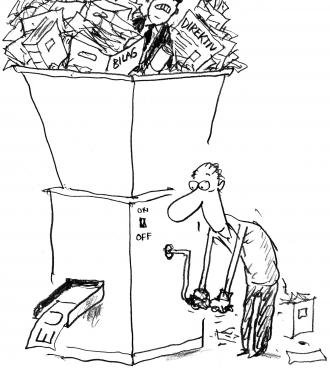Hei,
Vuosien surffailun jälkeen olen havainnut että eri tavoin EU-kriittiset ryhmät/organisaatiot analysoivat tilannetta yllättävän samansuuntaisesti.
Yksi parhaita ja selkeimpiä analyyseissään on englantilainen Open Europe
Open Europe - independent think tank calling for radical reform of the EU http://www.openeurope.org.uk/events/
In order to widen the debate about the future of the EU, Open Europe will be organising events across Britain and Europe. To receive information about future events please sign up to receive our fortnightly bulletin.
Tällä kertaa lähetän Sinulle englantilaisen Open Europe –järjestön viimeisimmän
tilannekatsauksen maaliskuulta otsikolla ”EU-sääntely (lainsäädäntö): Paranemassa vai karkaamassa käsistä?
EU Regulation: Getting Better Or Out Of Control? - March 30 2009
Katsauksen sisältö on lyhyesti sanottuna seuraava (oma vapaa käännös):
EU:n säädösten määrä kasvaa muutamista (hyvistäkin) korjausyrityksistä huolimatta tasaisen vauhdikkaasti vuodesta toiseen. Samaa tahtia nousevat niiden aiheuttamat kustannukset sekä jäsenvaltioille että niiden yrityksille (Englannissa näistä on tehty laskelmia). Olennaisin kysymys on siis, ei pelkästään säädösten määrä sinällään, vaan niiden aiheuttamat kustannukset. Raportti osoittaa siis että on kasoittain sääntöjä, ne ovat monimutkaisia ja aiheuttavat kustannuksia.
Komissio on jatkuva ongelma, mutta ehkä vielä suurempi ongelma on tällä hetkellä parlamentti (- teksti ei tarkemmin kerro miksi, mutta voin palata asiaan omin tiedoin toisessa yhteydessä). Tekstissä komission edustaja vetoaa subsidiariteettiin (eli että asioista päätettäisiin lähellä, eli jäsenvaltioissa aina kun vain voidaan), kun taas muu teksti juuri osoittaa että sellaista yhä vähemmän on olemassa!
1. Open Europe Research Director Mats Persson presented the findings of Open Europe’s report, which calculated the cost of EU regulation since 1998 to the UK economy and the EU as a whole.
He said that, “Our conclusion is that although various positive steps have been taken to reduce or simplify the existing burden of regulation, the EU’s Better Regulation Agenda has not addressed the flow of new regulation, which means that the cost of EU regulation is going up, year on year.”
He argued that the European Commission had launched several good initiatives to tackle existing regulation but that, “When it comes to concrete results a lot of the benefits have been neutralised by the continuous flow of new regulation, and more importantly the cost imposed by that flow.”
Mats outlined some of the recommendations in the report, including an independent board to act as a filter to oversee and veto Commission proposals for new regulation. He concluded, “This idea of cultural change...needs to continue. The idea of ‘more regulations meaning more Europe’ must be resisted, particularly in times of recession.”
2. Christofer Fjeltner, MEP, welcomed Open Europe’s report and the opportunity to debate the issue of regulation, saying, “Putting a price tag and making everything that politicians don’t see with their proposals visible, I think, is extremely important.”
He said, “I still think the fundamental idea of the European Union is deregulation and simplification because I think that is the best thing with the internal market...the idea of facilitating the free movement of goods, services, capital and people through deregulation and streamlining the vital parts of EU legislation.” He argued the importance of distinguishing between different EU institutions and different EU politicians. He said, “There are definitely different Commissioners with different approaches and different price tags, so to speak. There are definitely different MEPs with different approaches and different price tags”. He added that, “I think that one of the biggest problems right now in deregulation is maybe not the Commission but might be my own institution, the European Parliament.”
He added that businesses also have a role to play: by resisting the temptation to ask the EU to ‘regulate up’ to national standards, “not using regulation as a tool to hit the other guy”.
3. Marianne Klingbeil, Director of the European Commission Secretariat General, Better Regulation, Programming and Impact Assessment,
said, “We live in a society that is older and richer...We have a request for safety, we have a request for environmental protection, which we didn’t have to this extent ten, twenty, thirty years ago.” She agreed with the importance of subsidiarity: “You have to make sure that you have at European level and at national level what needs to be regulated at national and European Level - in other words subsidiarity”. She concluded by arguing that the Commission’s decision making process was improving and agreed that both subsidiarity and improving the processes were key but rejected Open Europe’s proposal for an independent board to evaluate Commission proposals.
4. Jens Hedström, Chair of the Business Europe Better Regulation Working Group, said that, “What our members want is a regulatory system that is easy to understand and regulations that are easy to comply with.
This report shows that there are a lot of rules, they are very complex and we have a price tag on it, which is very costly for business.” “Sometimes businesses are prepared to pay the cost for regulation if the consumers are prepared to pay the price, but sometimes they are not, and then we have competitiveness for businesses as a problem.” He said that, “We have seen a Commission now with political commitment and a target working on the systems. I’m not saying that they are working perfectly weIl, they are not...but they are starting in the right direction.” He urged all EU institutions to take on the Better Regulation Agenda.
5. Professor Jacques Pelkmans said,
“I appreciate the study and I value the message.” he complimented the extent and depth of the research and its contribution to the debate on regulation, saying, “Many preach to do this pain-staking work but Open Europe has done a serious attempt at it.” He said that, “You are not anti-EU, if you’re tough on regulatory issues at EU level”. Referring to EU decision making, he called for more transparency, particularly with regard to comitology decisions within the Commission. He criticised aspects of Open Europe’s report, including the failure to adequately consider the benefits of regulation and the extrapolation of EU-wide figures from UK data. He said that, “I read the study as a cry for more serious work...but take this positively.”
Professor Pelkmans also said that figures in the report showing the growing number of EU regulations were misleading, if not fully explained.
6. Mats Persson responded
to Professor Pelkmans, arguing that the report was aimed at measuring the cost of rather than the number of regulations for this very reason: “The report was written in the context of the British debate, which is focussed on the number of pages of regulation, absolute number of regulations, ‘the acquis communitaire is growing by X pages each year’, which we don’t think is a meaningful measure. That’s precisely why we focussed on cost and played down the absolute number”.
***

